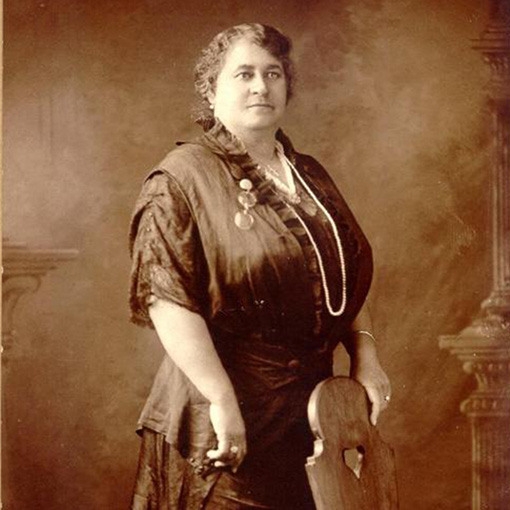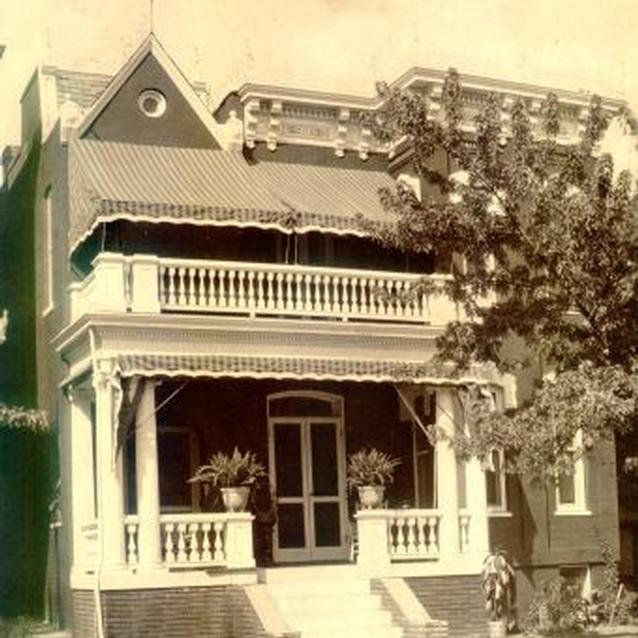In spite of humble beginnings in post-Civil War Richmond, Virginia, Maggie Lena Walker achieved national prominence as a businesswoman and community leader. Her business acumen, personality, and lifelong commitment to a beneficial burial society fueled her climb to success. She was the first African American woman in the United States to found a bank. As a leader her successes and vision offered tangible improvements in the way of life for African Americans and women.
Achievements

National Park Service, Maggie L. Walker National Historic Site
When she was a teenager, Maggie Mitchell joined the local council of the Independent Order of St. Luke. This fraternal burial society, established in 1867 in Baltimore, administered to the sick and aged, promoted humanitarian causes and encouraged individual self-help and integrity.
She served in numerous capacities of increasing responsibility for the Order, from that of a delegate to the biannual convention to the top leadership position of Right Worthy Grand Secretary in 1899, a position she held until her death. Under her leadership the Order's membership and numbers of councils were significantly increased throughout the country and its finances achieved solvency. Through sound fiscal policies, a genius for public relations and enormous energy, she took a dying organization, gave it life and helped it thrive.
In 1902 Mrs. Walker established a newspaper, The St. Luke Herald, to promote closer communication between the Order and the public. In speeches Mrs. Walker had reasoned, "Let us put our money together; let us use our money; Let us put our money out at usury among ourselves, and reap the benefit ourselves." Two years later, in 1903 she founded the St. Luke Penny Savings Bank. Mrs. Walker served as the bank's first president, which earned her the recognition of being the first African American woman to charter a bank in the United States.
Later she agreed to serve as chairman of the board of directors when the bank merged with two other Richmond banks to become The Consolidated Bank and Trust Company. Until 2009, the bank thrived as the oldest continually African American-operated bank in the United States.
In addition to her work for the Independent Order of St. Luke, Maggie Walker was active in civic groups. As an advocate of African American women's rights, she served on the board of trustees for several women's groups. Among them were the National Association of Colored Women and the Virginia Industrial School for Girls. To assist race relations she helped to organize and served locally as vice president of the National Association for the Advancement of Colored People (NAACP) and was a member of the national NAACP board. She also served as a member of the Virginia Interracial Commission.
Family Life
The House

National Park Service, Maggie L. Walker National Historic Site
The residence at 110 1/2 East Leigh Street was built in 1883. The address was a prime location in the heart of Jackson Ward, the center of Richmond's African American business and social life at the turn of the century. The Walkers purchased the house in 1904 and soon began making changes. Central heating and electricity were added, and with the addition of several bedrooms and enclosed porches, the home increased from nine to 28 rooms. In 1928 an elevator was added in the rear of the house to provide Mrs. Walker access to the second floor.
The Walker family owned the home until 1979, when it and all the contents were purchased by the National Park Service.
The furnishings throughout the home are original family pieces. They are valuable in understanding the 1904-1934 period of her occupancy. Together the house and the furnishings help us to learn more about Maggie Walker and the world in which she lived. Her community of Jackson Ward, a National Historic Landmark District, continues to exemplify the success of African American entrepreneurship.
Last updated: August 17, 2018
